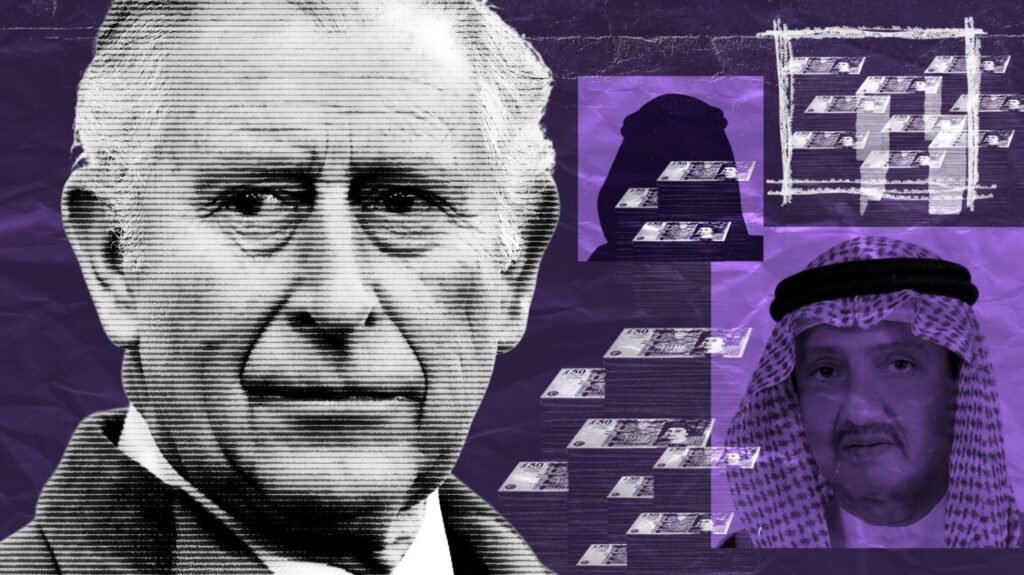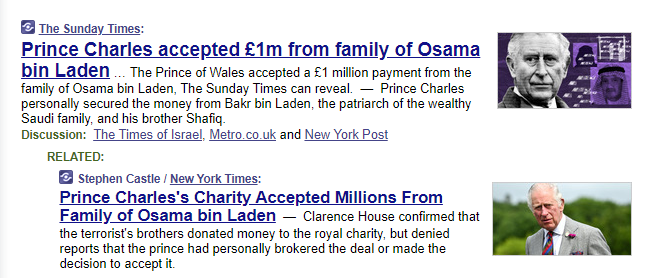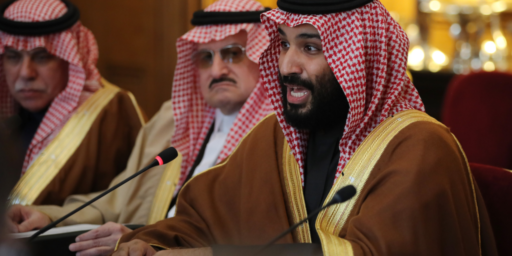Prince Charles Charity Accepted £1m from Bin Laden Family
Some light fundraising whilst waiting for mum to die.

Two things that most everyone knows about media coverage is that outlets have a powerful ability to shape our perception of reality through the way they frame stories and that most people never read beyond the headlines. This morning’s perusal of memeorandum gave me an illustrative example of both.

I am not what you would call an avid royal watcher. Still, The Sunday Times headline was startling enough that I might have been tempted to click through and read. Conversely, the New York Times headline is sufficiently banal that I likely wouldn’t have. Regardless, the two headlines, taken independently, leave radically different impressions.
Because memeorandum presents the drop head in addition to the main headline, we get another insight: the reports indeed convey much different takes on the story.
The Prince of Wales accepted a £1 million payment from the family of Osama bin Laden, The Sunday Times can reveal.
Prince Charles secured the money from Bakr bin Laden, the patriarch of the wealthy Saudi family, and his brother Shafiq. Both men are half-brothers of Osama bin Laden, the founder of al-Qaeda who masterminded the September 11 attacks.
Charles, 73, had a meeting with Bakr, 76, at Clarence House in London on October 30, 2013, two years after Osama bin Laden was killed by US special forces in Pakistan.
The future king agreed to the money despite the initial objections of advisers at Clarence House and the Prince of Wales Charitable Fund (PWCF), where the offering was donated.
Alas, the article is paywalled and I, not living in London, am not going to subscribe.
NYT:
Prince Charles, heir to the British throne, faced new scrutiny over the financing of his charities on Saturday after a report found that one organization had accepted a donation of 1 million pounds ($1.21 million) from the family of Osama bin Laden.
As first reported by The Sunday Times of London, The Prince of Wales’s Charitable Fund received the donation in 2013 from the brothers Bakr and Shafiq bin Laden, half brothers of Osama bin Laden, the founder of Al Qaeda and architect of the Sept. 11 attacks.
News of the payment follows a series of recent royal scandals, including a report in June that Prince Charles had accepted $3.1 million in cash donations from a Qatari billionaire between 2011 and 2015, some of which was received personally in a suitcase and shopping bags.
The bin Ladens are a powerful Saudi family, whose multinational construction business and close ties to the Saudi royal family have made them extremely wealthy. There is, however, no suggestion that either Bakr or Shafiq bin Laden has sponsored, supported or been involved in any acts of terrorism. And the family disowned Osama bin Laden in 1994 when Saudi Arabia stripped him of his citizenship because of his extremist activities.
On Saturday, Clarence House, the prince’s official office and residence, confirmed that the bin Laden brothers had given the money to the royal charity but disputed reports that Prince Charles had brokered the deal or made the decision personally to accept it.
“The Prince of Wales’ Charitable Fund has assured us that thorough due diligence was undertaken in accepting this donation,” read a statement released by Clarence House.
“The decision to accept was taken by the charity’s trustees alone and any attempt to characterize it otherwise is false,” the statement added.
But The Sunday Times reported that Prince Charles had brokered the payment after a private meeting with Bakr bin Laden at Clarence House in London on October 30, 2013, two years after Osama bin Laden was killed in Pakistan.
The paper also reported that the heir to the throne had agreed to accept the donation despite the vocal objections of his own advisers.
A royal official, unauthorized to speak publicly, denied that the prince accepted the donation, negotiated the deal or was advised to return the money.
The Sunday Times reported that some of the prince’s aides had warned Charles of the inevitable blowback should it become known that his charity had accepted money from the family of the man who orchestrated the terrorist attacks that killed nearly 3,000 people, including 67 Britons.
Founded in 1979, The Prince of Wales’s Charitable Fund says that its mission is “to transform lives and build sustainable communities by awarding grants to a wide range of good causes within our core funding themes: heritage and conservation, education, health and well-being, social inclusion, environment and countryside.”
For good measure, BBC (“Prince Charles accepted £1m from Osama Bin Laden’s family – report“):
The Prince of Wales accepted a payment of £1m from the family of Osama Bin Laden, the Sunday Times reports.
Prince Charles accepted the money from two of Osama Bin Laden’s half-brothers in 2013, two years after the al-Qaeda leader was killed, it adds.
The Prince of Wales’s Charitable Fund (PWCF) received the donation.
Clarence House said it had been assured by PWCF that “thorough due diligence” had been conducted, and the decision to accept the money lay with the trustees.
“Any attempt to characterise it otherwise is false,” it told the BBC.
Clarence House also said it disputed a number of points made in the newspaper’s article.
At the same link, “Royal Correspondent” Jonny Dymond offers this analysis:
No rule has been broken, no law has been broken. All appropriate checks were carried out and even the Foreign Office was called upon to give its opinion – it cleared the donation.
So how is this front page news?
A source at the Prince of Wales’s Charitable Fund told the BBC that “the sins of the father” – that’s Osama Bin Laden – should not disqualify other members of the family from making a donation. Which makes sense.
But equally, did Prince Charles or his inner circle really think it was a good idea to take money from the Bin Ladens? Or did they think it was fine so long as it was never made public?
Because once it was public – however many checks were made and rules were followed – it was always going to look horrible.
Just like the enormous cash donation from a former Qatari Prime Minister or the letter from Prince Charles’s close friend and aide promising a knighthood to a Saudi citizen who had promised and made substantial donations.
Ministers and members of parliament are, in the end, governed by the ballot box. The Royal Family derives its position and authority from a different place, from a settled acceptance by the public that overall they bring credit to the country.
Does a donation from the Bin Ladens – however remote from the evildoing of a disowned son – fit into this model of monarchy?
So . . . Dymond seems to have answered his own question! It’s front page news because “it was always going to look horrible” if the news got out because “The Royal Family derives its position and authority from a different place, from a settled acceptance by the public that overall they bring credit to the country.”
Did the Bin Ladens make their money from the terrorism business? Nope. They made it by courting favor with the despots who run their country—which is pretty much the only way to get rich in Saudi Arabia unless you’re born into the royal family.
As to the headlines, I’d give a slight edge to the Times of London. The story is indeed that Prince Charles met with the Bin Ladens and agreed to accept their donation. I would have given the edge to the NYT, which gives the more salient fact that the money went to his charity, except for the fact that they oddly say it was “millions” when it was just one million pounds or 1.2 million dollars. Presumably, they got to the “millions” by adding in the $3.1 million from the Qatari source. Which they shouldn’t have done, since it’s a completely different source.
As to the crux of the thing, I tend to side with the adage that all money is good money.* If one thinks the Bin Ladens are bad people and Charles’ charity generally does good works, it stands to reason that the money is better in the latter’s hands. The caveat is whether there is an appearance of impropriety. What did the Bin Ladens expect to gain by making this donation? Clearly, not publicity as it remained unknown to the public for nine years. A chance to meet privately with one of the world’s most famous people? Some sort of favors from a largely powerless monarch-in-waiting? A knighthood, maybe?
Absent more information on that front, I’ll default back to taking the money.
_______________
*The notable exception is when playing dominoes.




I read this story in the NYT this morning and was questioning whether it should have even been published. The family had repudiated Osama long before 9/11 and, as you said, relatives should not automatically be held responsible for someone’s actions. But the article was a good one and fair, and I realized there will be a lot of sensationalist crap written about it, so it’s good to have a non-sensational piece out there.
There’s a saying that you are known by the company you keep. Fair or not, the bin Laden’s carry a stain and this contribution can be seen as buying penance, but it also plays out in the larger question, as to whether charities should be accepting money from any source connected to Saudi Arabia. It all maybe legal and the I’s were dotted and the T’s crossed, but it’s not passing the smell test.
I’m of the opinion that “the money does not stink”.
What the Prince’s Trust does with the money is a lot more pertinent than where it came from.
I also note that if folks are worried about the bin Laden family seeking positive publicity, well, that’s exactly what you’re giving them by running this story.
If the bin Ladens offered me a million $, no strings attached, would I take it? That would depend on whether I actually believed there really were no strings attached.
One wonders why the bin Ladens don’t change their family name to al Salaam or something.
@Sleeping Dog: That is completely ridiculous. Unless
This is really nothing very different than blood libel against Jews for their religion and ethno-national identity. Unless such people are actively promoting bin Sultan or the Wahhabite theology, they are no more responsible for the state, than the average American was for CIA black sites.
@Kathy: why should they? It would be (1) cowardly, (2) do nothing at all as the same Anglo-American yellow journalists would still hound them, (3) imply that the wider family indeed is guilty. It is a lose-lose.
The major difference between the Clarence House account and the Times version seems to be that latter saying the bin Ladens had a personal meeting with Charles, who personally approved the donation.
Whereas the royal press source insists it was handled by officials.
To be honest, I can’t see Charles personally poring over the paperwork; that’s what the staff are for.
Would have been put up to him to sign off on, given the names? Quite likely, but probably no more than that. Nothing about Charles history suggests he’ a “hands on” and “deep in the details” type with this sort of thing. It’s just not how the Royals run things.
As for the meeting difference, the explanation could be if the bin Ladens were invited to a garden party or suchlike that the Trust throws for donors and volunteers.
They’d get a handshake and a minute of face time along with a hundred or so others.
A non-meeting meeting.
(Can’t help a mental image of Charles, not realising who they were, asking “And your family; all doing well, I trust?”)
The wider question is, just how healthy it is for Arabian wealth to be plugged direct in to the highest political/social circles in London?
And how far that may induce attitudes that skew wider policy making.
Attendance at that sort of event may not get you much contact with the Royals; but you can bet that a fair number of senior politicians, financiers etc were also around for some high level schmoozery.
See also the level of high level political and social connections of Russian oligarchs, until recently.